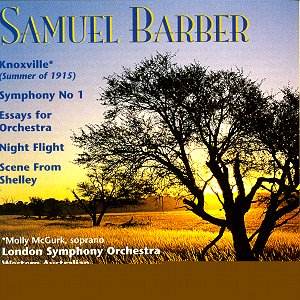This
reissue from several Unicorn-Kanchanas is very welcome not least
for Measham’s wonderful reading of Barber’s First Symphony (cast
in one continuous movement) which deservedly won a three-star
rating in the Penguin Guide. It reminds us how well Measham empathised
with Barber’s musical language. Especially moving, in this performance,
is the Symphony’s lovely slow section with its long plaintive
oboe melody over held strings and harp chords, and its great emotional
climax. But Measham’s readings of the turbulent opening movement
and the equally assertive Passacaglia are just as powerful. One
of the best and most committed performances of this Symphony I
can remember. Night Flight, is the slow movement of Barber’s
Second Symphony, abandoned by its composer after its negative
reception, was written at the time of, and influenced by Barber’s
service in the US Army Air Force of World War II. With thin but
telling orchestration Barber uncannily captures the inky-black
sky and atmosphere of anxiety and sheer loneliness of night flying.
Another
intense reading is Barber’s Essay No. 1 with its slow meditative
opening for sweetly mournful strings before the pace quickens
and drama and emotion fired as the music then pushes forward to
a more playful section (for woods and piano) but seamed with pathos
then brushed brutally aside. The Essay No. 2 is another
exciting and atmospheric piece. Written in 1942, this work speaks
of its times; urgent, jagged, hard-edged material full of conflict
and the brutality of war contrasted with more tender and pastoral
music laced with hesitant nervous humour and prayer for ultimate
victory.
Scenes
from Shelley is the earliest Barber work in this compilation.
Composed in 1931, its inspiration is Prometheus Unbound.
The connection between the music and Shelley, or the Greek myth
for that matter, is somewhat ambiguous but again this is another
impressive work that deserves to be better known. Its atmospheric
opening for slow swirling strings moves through shredding mist
to cataclysmic climaxes and a grand heroic theme with thrilling
trumpet ostinatos suggesting sunlight and deliverance.
Knoxville:
Summer of 1915 is a hauntingly lovely, often wistful evocation,
but without cloying sentiment, of a lazy summer evening in a small
American town, the time of day before the poet (James Agee (1909-1955)
reminiscing in Partisan Review) as a child is taken off
to bed. There are people passing by, others sitting on porches,
a tramcar passes by … I am in two minds about Molly McGurk’ light
youthful lyric soprano voice; undoubtedly it fits well with the
section in which ‘my father and mother have spread quilts…We all
lie there…’; and in the poet’s quiet prayer for his people, and
in the final celestial ‘but who will ever tell me who I am.’.
(Finzi-like in Intimations of Immortality mode). But, although
I applaud Measham’s beautifully evocative accompaniment, I would
have welcomed a more mellow voice that would imply nostalgia,
memories recollected in maturity. The timbre and wider range of
Barbara Hendricks with Michael Tilson Thomas conducting the London
Symphony Orchestra is a much more successful and more expressive
performance (on EMI 5 55358 2).
Knoxville
excepted (Hendricks/Tilson Thomas on EMI, preferred), these are
powerful and committed performances of these exciting and atmospheric
Barber works.
Ian
Lace
see
also review by Rob
Barnett
